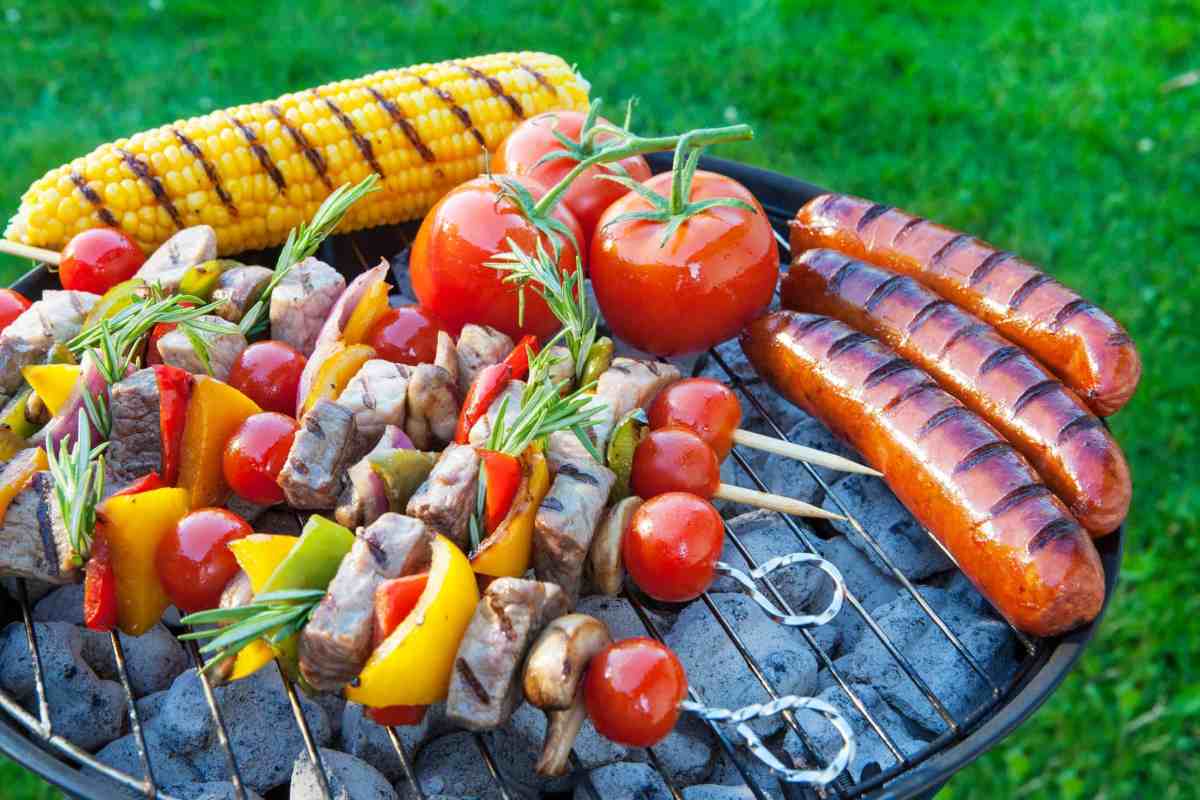Fire up the grill and prepare for a flavor explosion! This isn’t your average BBQ; we’re diving into a world of heart-healthy grilling, where vibrant vegetables, lean proteins, and naturally sweet fruits reign supreme. Imagine juicy grilled chicken breast marinated in a zesty citrus blend, alongside perfectly charred asparagus spears and sweet grilled pineapple. This guide unveils delicious recipes and meal plans, proving that healthy eating can be incredibly satisfying and utterly delicious, all without sacrificing the joy of summer grilling.
We’ll explore a range of lean protein options, from succulent fish fillets to flavorful tofu, each prepared with flavorful, low-sodium marinades. Learn how to maximize the nutritional benefits of your favorite vegetables by grilling them to perfection, preserving their vibrant colors and textures. Discover the surprising sweetness and delightful textures unlocked by grilling fruits like peaches and pineapple. Finally, we’ll assemble it all into a complete, balanced meal plan, ensuring your summer BBQs are both delicious and beneficial for your well-being.
Heart-Healthy Grilled Vegetables
Grilling vegetables is a fantastic way to enjoy their natural flavors while adding a delicious smoky char. This method minimizes the need for added oils and fats, making it a perfect choice for a heart-healthy diet. The vibrant colors and textures of grilled vegetables also make them a visually appealing addition to any meal. Let’s explore some delicious and nutritious options.
Heart-Healthy Grilled Vegetable Recipes
Below are five recipes for grilling vegetables, focusing on minimal oil and maximum flavor. These recipes are designed to be adaptable to your taste preferences and the vegetables you have on hand. Remember to preheat your grill to medium heat before starting.
| Vegetable | Preparation | Grilling Time | Seasoning |
|---|---|---|---|
| Zucchini | Halve lengthwise, then slice into ½-inch thick half-moons. | 5-7 minutes, turning halfway | Salt, pepper, garlic powder, oregano |
| Bell Peppers | Cut into large chunks. | 8-10 minutes, turning occasionally | Salt, pepper, paprika, cumin |
| Asparagus | Snap off the tough ends. | 5-7 minutes, turning halfway | Salt, pepper, lemon juice, a drizzle of olive oil |
| Eggplant | Cut into ½-inch thick slices, brush lightly with olive oil. | 10-12 minutes, turning occasionally | Salt, pepper, balsamic vinegar, thyme |
| Onions | Cut into thick wedges. | 10-15 minutes, turning occasionally | Salt, pepper, brown sugar, a touch of olive oil |
Nutritional Benefits of Grilled Vegetables
Grilling vegetables preserves many of their essential nutrients. Each vegetable offers a unique profile of vitamins and minerals contributing to overall health, particularly cardiovascular health.
The following lists the nutritional benefits of the vegetables included in the recipes above:
- Zucchini: Rich in vitamin C, potassium, and antioxidants, supporting immune function and blood pressure regulation.
- Bell Peppers: Excellent source of vitamin C, vitamin A, and antioxidants, contributing to immune support and eye health.
- Asparagus: Provides folate, vitamin K, and antioxidants, supporting cell growth and blood clotting.
- Eggplant: Contains antioxidants, fiber, and potassium, contributing to heart health and digestive regularity.
- Onions: A good source of antioxidants, vitamin C, and quercetin, which may have anti-inflammatory properties.
Grilled Vegetable Platter Image Description
Imagine a vibrant platter overflowing with grilled vegetables. Sizzling grill marks adorn the plump zucchini slices, their pale green contrasting beautifully with the fiery orange and red of the bell peppers. The asparagus spears, a deep emerald green, are perfectly tender-crisp, while the eggplant boasts a rich, smoky purple hue. The caramelized onions, glistening with a touch of brown sugar, offer a sweet counterpoint to the other vegetables’ savory notes. The overall effect is a tapestry of colors and textures, a feast for both the eyes and the palate. Each vegetable retains its natural shape and form, showcasing the benefits of careful grilling. The platter is garnished with fresh herbs, enhancing its visual appeal and adding a burst of aromatic freshness.
Lean Protein Choices for the Grill

Grilling lean protein is a fantastic way to enjoy delicious, healthy meals during the summer months. Lean protein sources offer a wealth of nutritional benefits, contributing to a balanced diet while maintaining a healthy weight. Selecting the right protein and employing flavorful, healthy marinades are key to achieving both deliciousness and dietary goals. This section explores three lean protein options, highlighting their unique grilling characteristics and nutritional profiles.
Grilling Lean Proteins: Recipes and Techniques
Choosing lean protein sources for grilling ensures a heart-healthy meal while maximizing flavor. The following recipes utilize simple yet effective marinades that enhance the taste of the protein without adding excessive sodium or fat.
Grilled Lemon Herb Chicken Breast
Ingredients: 2 boneless, skinless chicken breasts, 2 tablespoons olive oil, 1 tablespoon lemon juice, 1 teaspoon dried oregano, 1 teaspoon dried basil, ½ teaspoon garlic powder, salt and pepper to taste.
Instructions: Whisk together olive oil, lemon juice, oregano, basil, garlic powder, salt, and pepper. Marinate chicken for at least 30 minutes, or up to 4 hours. Preheat grill to medium-high heat. Grill chicken for 5-7 minutes per side, or until cooked through and internal temperature reaches 165°F (74°C).
Grilled Salmon with Dill and Lime
Ingredients: 2 salmon fillets (6-8 ounces each), 2 tablespoons olive oil, 1 tablespoon lime juice, 1 tablespoon chopped fresh dill, ½ teaspoon garlic powder, salt and pepper to taste.
Instructions: Combine olive oil, lime juice, dill, garlic powder, salt, and pepper. Marinate salmon for 15-30 minutes. Preheat grill to medium heat. Grill salmon for 3-5 minutes per side, or until cooked through and flakes easily with a fork.
Grilled Tofu Steaks with Peanut Sauce
Ingredients: 2 blocks extra-firm tofu, pressed and cut into 1-inch thick steaks, ¼ cup peanut butter (natural, no added sugar or salt), 2 tablespoons soy sauce (low sodium), 1 tablespoon rice vinegar, 1 tablespoon honey or maple syrup, 1 tablespoon sesame oil, 1 teaspoon grated ginger.
Instructions: Whisk together peanut butter, soy sauce, rice vinegar, honey/maple syrup, sesame oil, and ginger. Marinate tofu for at least 30 minutes. Preheat grill to medium heat. Grill tofu for 4-6 minutes per side, or until golden brown and heated through.
Cooking Times and Temperatures for Optimal Doneness
Achieving perfectly cooked grilled protein requires understanding the nuances of each type. Chicken breast, being a denser protein, requires longer cooking times and higher temperatures to reach a safe internal temperature. Salmon, with its delicate texture, cooks more quickly at lower temperatures to prevent dryness. Tofu, while firm, requires careful grilling to achieve a desirable texture without burning. Overcooking any of these proteins can result in dryness and toughness. Using a meat thermometer is recommended to ensure the internal temperature reaches the safe minimum.
Nutritional Benefits of Lean Protein Sources
The following table summarizes the approximate calorie count and key nutritional benefits per serving (approximately 4 ounces) of each protein source. These values can vary slightly depending on the specific preparation method and ingredients used.
| Protein Source | Calories (approx.) | Key Nutritional Benefits |
|---|---|---|
| Chicken Breast | 165 | High in protein, excellent source of lean protein, good source of niacin and selenium. |
| Salmon | 200 | Rich in omega-3 fatty acids, high in protein, excellent source of vitamin D and B vitamins. |
| Tofu | 80 | Good source of plant-based protein, high in iron, provides isoflavones. |
Flavorful and Healthy Marinades
Marinades are the secret weapon for creating incredibly flavorful and tender grilled dishes. They not only enhance the taste of your meat and vegetables but also help retain moisture during the grilling process, preventing dryness and maximizing juiciness. By carefully selecting ingredients, you can create healthy, low-sodium, and low-sugar marinades that are bursting with flavor without compromising your health goals.
The benefits of marinating before grilling extend beyond simple flavor enhancement. The acids in citrus juices and the enzymes in some herbs tenderize tough cuts of meat, making them more palatable and easier to chew. Marinades also act as a barrier, protecting the surface of the food from direct heat and preventing charring while still allowing for beautiful grill marks.
Healthy Marinade Recipes
These three marinade recipes showcase the versatility of herbs, spices, and citrus, offering a range of flavor profiles while remaining low in sodium and sugar.
- Citrus Herb Marinade: This bright and zesty marinade is perfect for chicken, fish, or firm vegetables like bell peppers and zucchini. It features a vibrant blend of lime juice, fresh oregano, and a hint of garlic. The marinade’s color is a sunny yellow-green, punctuated by flecks of fresh herbs. The texture is thin and slightly viscous from the lime juice, with visible herb pieces adding a touch of rustic charm.
- Spicy Southwest Marinade: This marinade delivers a fiery kick with a touch of sweetness. It uses a combination of chipotle peppers in adobo sauce (carefully measuring for spice level and sodium content), lime juice, cumin, and a small amount of honey or maple syrup for a subtle sweetness. Imagine a deep reddish-brown hue, almost mahogany in its richness. The texture is slightly thicker due to the chipotle peppers, creating a coating that clings beautifully to the food. Tiny flecks of chipotle pepper are visible throughout the rich, dark marinade.
- Mediterranean Herb Marinade: This aromatic marinade is ideal for lamb, pork, or eggplant. It incorporates fresh rosemary, thyme, lemon juice, and a touch of garlic. This marinade showcases a pale yellow-green, the bright color of fresh lemon juice contrasted with the darker tones of the herbs. Its texture is relatively thin and watery, infused with the vibrant aromas of fresh herbs.
Grilled Fruit for a Sweet Treat
Grilling fruit transforms a simple dessert into a captivating culinary experience. The process caramelizes the natural sugars, intensifying the fruit’s inherent sweetness and creating a delightful contrast between the warm, slightly charred exterior and the juicy, tender interior. This technique unlocks a depth of flavor often missed in raw fruit, offering a healthier and equally satisfying alternative to traditional desserts.
Grilling enhances the flavor and texture of various fruits in unique ways. The heat gently softens the flesh of fruits like peaches and pineapples, concentrating their sweetness and creating a melt-in-your-mouth texture. Berries, while maintaining their individual form, develop a subtle smoky char that adds complexity to their naturally bright flavors. The caramelization process also introduces a delightful depth of flavor that complements the fruit’s existing sweetness.
Grilled Pineapple with a Hint of Cinnamon
This recipe showcases the tropical sweetness of pineapple, enhanced by the warm spice of cinnamon. The caramelized exterior offers a pleasing contrast to the juicy interior.
- Peel and core a ripe pineapple, then cut it into 1-inch thick rings.
- Lightly brush both sides of the pineapple rings with olive oil and sprinkle generously with ground cinnamon.
- Preheat your grill to medium heat. Place the pineapple rings on the grill grates and cook for 2-3 minutes per side, or until grill marks appear and the pineapple is tender.
- Remove from the grill and serve immediately. Optional: a dollop of plain Greek yogurt adds a creamy, tangy counterpoint.
Grilled Peach and Berry Skewers with Honey Glaze
This recipe combines the juicy sweetness of peaches with the vibrant tartness of berries, creating a balanced and refreshing dessert. The honey glaze adds a touch of sophistication without excessive added sugar.
- Wash and halve ripe peaches. Remove the pits.
- Thread peach halves and your favorite berries (strawberries, blueberries, raspberries) onto skewers.
- In a small bowl, whisk together 1 tablespoon of honey, 1 teaspoon of balsamic vinegar, and a pinch of salt.
- Lightly brush the skewers with the honey-balsamic glaze.
- Preheat your grill to medium heat. Grill the skewers for 2-3 minutes per side, or until the peaches are tender and slightly caramelized and the berries are heated through.
- Remove from grill and serve immediately. A sprinkle of fresh mint adds a refreshing touch.
Nutritional Benefits of Grilled Fruit
Grilling fruits doesn’t diminish their nutritional value; in fact, it can even enhance certain aspects. The gentle heat helps to retain vitamins and minerals while improving digestibility.
| Fruit | Nutritional Benefit |
|---|---|
| Pineapple | Rich in Vitamin C, manganese, and bromelain (an enzyme with anti-inflammatory properties). |
| Peaches | Excellent source of Vitamin A, Vitamin C, and fiber. Also contains antioxidants. |
| Berries (strawberries, blueberries, raspberries) | Packed with antioxidants, fiber, and various vitamins and minerals. Antioxidants help protect cells from damage. |
From the sizzle of the grill to the burst of flavor in your mouth, this journey into heart-healthy BBQ grilling has shown that healthy eating can be an absolute delight. By carefully selecting lean proteins, vibrant vegetables, and naturally sweet fruits, and using creative marinades, you can transform your summer BBQs into a celebration of flavor and well-being. So, gather your friends and family, fire up the grill, and enjoy the incredible taste of healthy, delicious grilled goodness! Remember to experiment with different flavors and combinations to find your perfect heart-healthy BBQ feast.
Commonly Asked Questions
Can I reuse marinades?
No, it’s not recommended to reuse marinades that have been in contact with raw meat or poultry due to potential bacterial contamination.
How long can I store grilled food?
Store leftover grilled food in the refrigerator within two hours of grilling. Consume within 3-4 days for optimal quality and safety.
What are some good substitutes for oil when grilling vegetables?
You can use cooking spray, a small amount of broth or water, or even let the vegetables’ natural juices help them from sticking to the grill.
Are all fruits suitable for grilling?
While many fruits grill well, those that are firm and hold their shape are best. Avoid overly soft or watery fruits.


